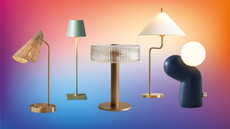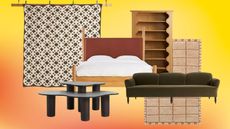PATRICIA URQUIOLA'S STYLE SECRETS
Spanish-born, Milan-based architect and designer Patricia Urquiola is one of the world’s most sought-after names in modern interiors, having collaborated with everyone from Italian furniture brand Cassina to iconic fashion house Louis Vuitton. She’s alsodesigned hotels such as the Mandarin Oriental in Barcelona and the W Retreat & Spa in Puerto Rico and masterminded shop interiors for shoe emporium Gianvito Rossi, lifestyle stalwart Missoni and watchmaker Panerai. Patricia has also designed kitchens for Boffi.
Here, she reveals her style secrets and inspiration...

How did you start your career?
I first studied architecture in Madrid, before graduating in Milan under the tutelage of Achille Castiglioni [the architect and designer best known for his Arco floor lamp for Flos]. Having assisted in Castiglioni’s lectures, both in Milan and Paris, I then joined designer Vico Magistretti to work on new product development at De Padova before becoming head of Piero Lissoni’s design studio. In 2001, I opened my own studio – after many collaborations and a big personal change (my divorce), I was ready to take the risk. An agent I knew decided to present one of my concepts to Patrizia Moroso and it went from there.

What are your earliest design memories?
My mother went to London when I was little and returned inspired by [designer] David Hicks – our playroom had orange carpet, white furniture and brown and white wallpaper with giant letter Cs. It was perfect. She also bought me a functionalist doll’s house with a flat roof.
Describe your design approach...
I like to connect people to their spaces – to give them flexibility. I also like to use quality materials such as wood, stone and glass and to make things very clear and uncomplicated. I like to open people’s minds to thinking about mixing and matching.

What inspires you?
I’m an observer – I try to look at society around me to understand how I can interpret and translate what I see in the present day into something that is still going to be contemporary in two years’ time. This is the most difficult part, but I’m lucky because with work, I travel a lot and see great diversity.

Who are your design heroes?
I have many, but Achille Castiglioni and Vico Magistretti helped me to discover my love for design and to have trust in myself to pursue my career. Magistretti was the first person I created a product with... this was so important for me as a young designer.
Why did you decide to make your home also your studio?
My work and my family are inextricably linked [Patricia’s second husband Alberto Zontone is a partner in Studio Urquiola in Milan – according to her, he’s ‘the numbers guy’: they have a ten-year-old daughter called Sofia. Patricia also has an elder daughter, Giulia, who is studying in London], so we built an apartment and a garden above the studio. I spend a lot of time in the studio, but when I need a break or want to see Sofia, I can walk upstairs. She knows where to find me when she needs me. The top floor is my personal space, my favourite space, next to our terrace garden, where we grow plants, herbs, vegetables, flowers and shrubs – it’s where the family can have time on our own.
What’s your top design tip?
It’s always important to find ways to bring in natural light where possible and to work best with artificial light if need be – if the light is wrong, it kills everything.

Why is innovation and quality so important to you?
I try to find new ways of living that bring comfort and practicality – such as redesigning a bathtub for Axor that’s luxurious, but economical in water usage. Maddalena De Padova [of De Padova furniture] gave me the best advice – she always had things she was working on in her house, so she could better understand what she was giving to others. She said, ‘Patricia, you can’t create something you don’t believe in, or you haven’t tried yourself’.
How do you like to work with colour?
I’m not chromophobic – for some brands, such as Moroso, the colour spectrum I play with is quite large – but I don’t always use colour in an obvious way. Colour can come from the texture of materials too. For instance, using different coloured and edged floorboards in my Biscuit parquet range for Listone Giordano, or patterned lava stone in my Boffi kitchen.

Which have been your most successful product designs so far?
I’ve been lucky to have a lot of products and projects that have enjoyed long-term success. For example, the Lowland and Fjord collections for Moroso; Tufty-Time, Bend and Outdoor for B&B Italia; Tatou for Flos; a tile collection for Mutina; and taps for Axor. I also loved designing Patrizia Moroso’s house.

How has your design approach evolved?
When I began, I was mainly focused on product, but now I’m involved in a more holistic and all-encompassing way, from what technology, material and packaging to use through to the company strategy, recyclability and how to explain the hidden values of the piece through advertising and promotion. Every element counts – and there’s always room for improvement.
What makes the perfect space?
If it’s a private project, it must feel personal and allow for the evolution of a person’s needs. Public spaces should welcome all walks of life – and make a lasting impression.

Find more info here.
Be The First To Know
The Livingetc newsletter is your shortcut to the now and the next in home design. Subscribe today to receive a stunning free 200-page book of the best homes from around the world.
The homes media brand for early adopters, Livingetc shines a spotlight on the now and the next in design, obsessively covering interior trends, color advice, stylish homeware and modern homes. Celebrating the intersection between fashion and interiors. it's the brand that makes and breaks trends and it draws on its network on leading international luminaries to bring you the very best insight and ideas.
-
 The 12 Best Table Lamps for Reading —I'm a Certified Bookworm (and Shopping Expert)
The 12 Best Table Lamps for Reading —I'm a Certified Bookworm (and Shopping Expert)When it comes to table lamps for reading, I don't mess around. If you're the same, this edit is for YOU (and your books, or course — and good recommendations?)
By Brigid Kennedy Published
-
 "It's Scandi Meets Californian-Cool" — The New Anthro Collab With Katie Hodges Hits Just the Right Style Note
"It's Scandi Meets Californian-Cool" — The New Anthro Collab With Katie Hodges Hits Just the Right Style NoteThe LA-based interior designer merges coastal cool with Scandinavian simplicity for a delightfully lived-in collection of elevated home furnishings
By Julia Demer Published

